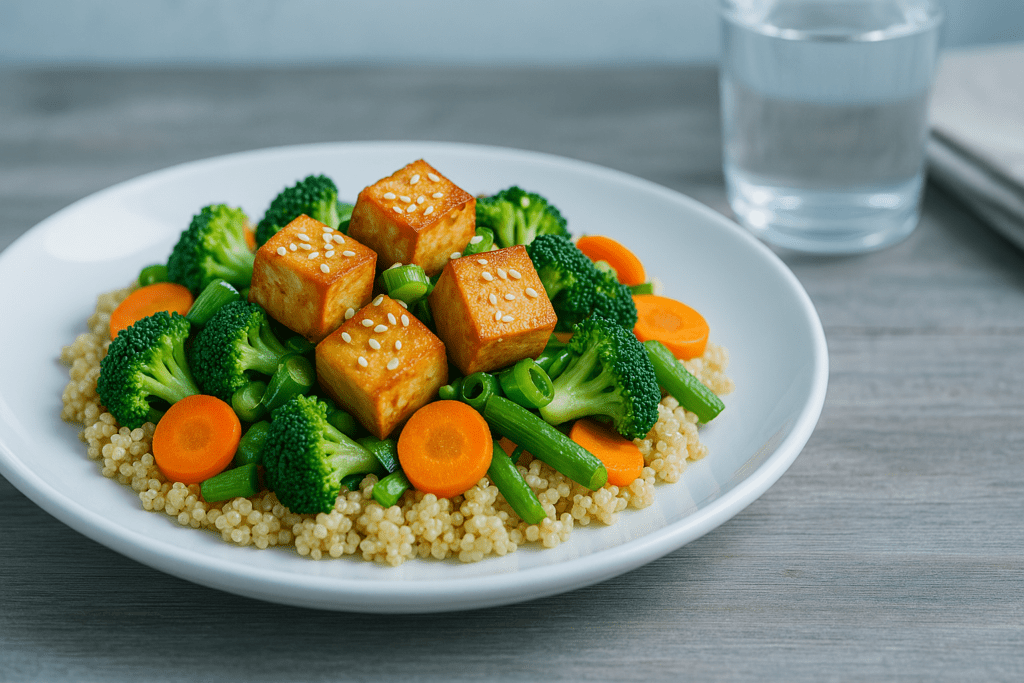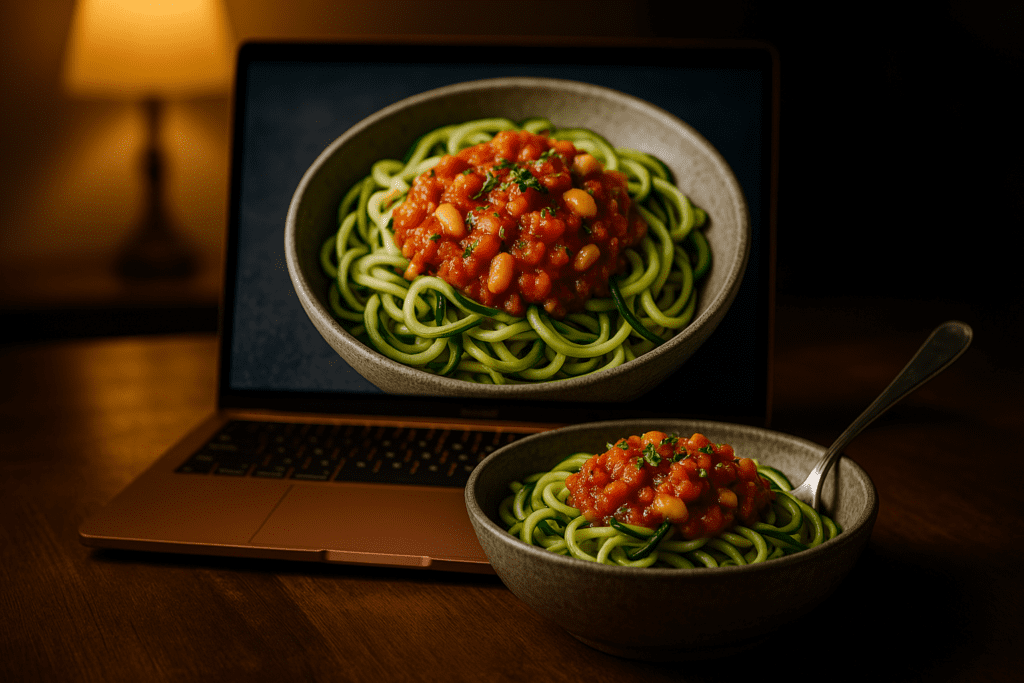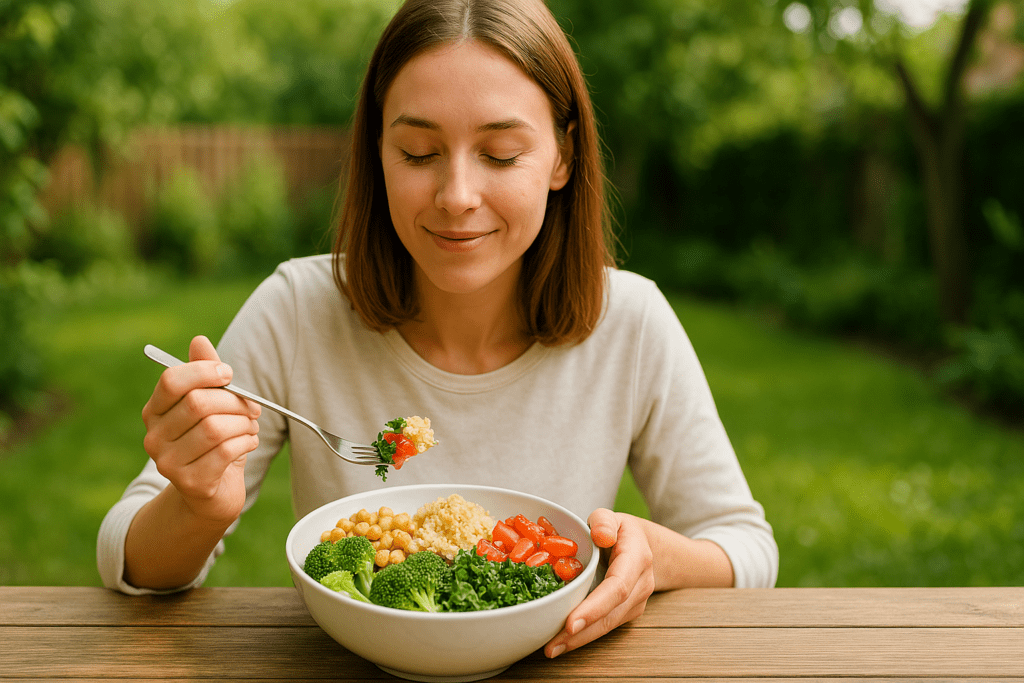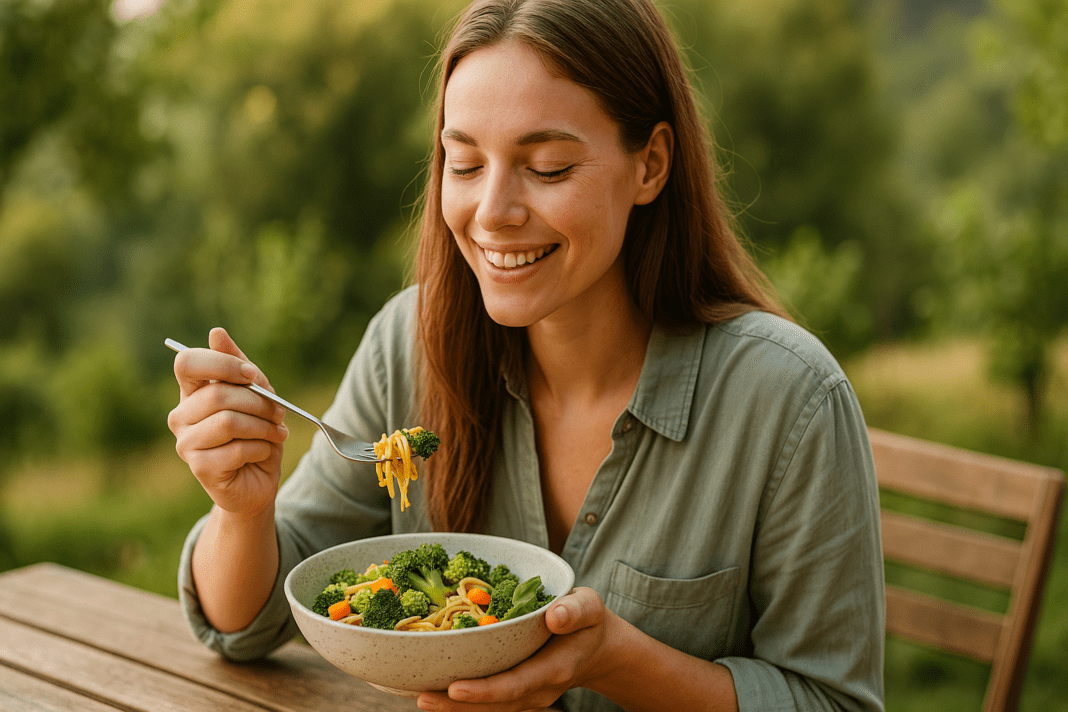Embracing a plant-based lifestyle offers numerous health advantages, particularly when meals are crafted with whole foods that are both nutritious and flavorful. For those seeking to maintain or lose weight while nourishing their bodies, finding satisfying low calorie vegan dinner recipes can be an empowering strategy. These meals, grounded in science and endorsed by leading nutrition experts, demonstrate that healthy eating does not have to mean sacrificing taste or enjoyment. In fact, when prepared thoughtfully, a low calorie vegan dinner can provide all the essential nutrients the body needs, all while being delicious and comforting.
You may also like: Healthy Plant-Based Dinners Made Easy: Best Whole Food Plant-Based Recipes for Beginners and Beyond
A growing body of research supports the health benefits of a whole-food, plant-based diet. Such diets are associated with lower risks of chronic conditions like heart disease, type 2 diabetes, and certain cancers. What makes this approach especially compelling is that it emphasizes the consumption of minimally processed foods—vegetables, fruits, whole grains, legumes, nuts, and seeds—while avoiding added sugars, refined oils, and excess sodium. These choices not only enhance nutritional intake but also naturally reduce caloric density, making it easier to enjoy larger portions without exceeding calorie goals. For those looking to explore these benefits without compromising on flavor, the following low calorie vegan dinner recipes offer a practical and enjoyable entry point.
One excellent recipe to begin with is a hearty lentil and vegetable stew. Lentils are a nutritional powerhouse—rich in protein, fiber, and iron—while being remarkably low in calories and fat. When simmered with a colorful array of vegetables such as carrots, zucchini, tomatoes, and spinach, the result is a deeply satisfying meal that nourishes and comforts. Seasoned with aromatic herbs like thyme, rosemary, and a touch of smoked paprika, this stew offers complex flavors without the need for heavy oils or cream. Nutrition experts often recommend meals like this because they support satiety, blood sugar balance, and digestive health, all while keeping caloric intake in check.

Another favorite among plant-based health enthusiasts is roasted cauliflower tacos with avocado-lime dressing. Cauliflower, when roasted until golden and crisp at the edges, provides a flavorful and filling base that mimics the heartiness of meat without the added calories. Tucked into a corn tortilla and topped with a tangy avocado-lime sauce, shredded cabbage, and fresh cilantro, these tacos deliver a satisfying crunch and a bright burst of flavor. They are a perfect example of how low calorie vegan dinner recipes can be both exciting and nutritionally balanced. Avocados, while higher in fat, offer monounsaturated fats that are heart-healthy and help the body absorb fat-soluble vitamins from vegetables.
For those seeking comfort in a bowl, a creamy butternut squash risotto made with arborio rice and blended cashew cream provides a rich and indulgent experience with fewer calories than traditional dairy-based risottos. Butternut squash contributes a subtle sweetness and vibrant color, while the cashew cream offers a velvety texture without the need for butter or cheese. Nutritionally, this dish offers beta-carotene, vitamin C, and fiber, making it a healthful and appealing choice. When paired with a side of sautéed kale or steamed broccoli, it becomes a complete meal that is as nourishing as it is comforting.
Chickpea and spinach curry is another meal that embodies the principles of plant-based health. Packed with plant-based protein, fiber, and antioxidants, chickpeas are a staple in many low calorie vegan dinner recipes. When combined with anti-inflammatory spices like turmeric, cumin, coriander, and ginger, and simmered in a tomato-based sauce, the result is a deeply flavorful curry that supports immune function and digestive health. Adding fresh spinach during the final minutes of cooking infuses the dish with iron, calcium, and vitamin K, further enhancing its nutritional profile. Served over a modest portion of brown rice or quinoa, this dish is both satisfying and weight-friendly.
Stuffed bell peppers offer a visually appealing and customizable dinner that fits well within a calorie-conscious framework. These can be filled with a variety of whole grains such as farro or bulgur, legumes like black beans or lentils, and diced vegetables ranging from mushrooms and corn to zucchini and onion. Seasoned with garlic, cumin, chili powder, and a touch of lime juice, each pepper becomes a self-contained, nutrient-rich meal. Baking the peppers until tender allows the flavors to meld beautifully, while avoiding the need for calorie-dense toppings like cheese. These stuffed peppers are not only a feast for the senses but also an excellent way to ensure balanced nutrition in a single dish.
Zucchini noodles with marinara sauce and tempeh meatballs is another innovative option that showcases how traditional comfort foods can be reimagined for better health outcomes. Spiralized zucchini serves as a low-calorie, high-fiber substitute for pasta, helping to control blood sugar and calorie intake. A homemade marinara sauce made from slow-cooked tomatoes, garlic, onions, and herbs offers a rich depth of flavor without added sugars or preservatives. Tempeh, a fermented soybean product, forms the base for protein-rich meatballs that are seasoned with Italian herbs and baked to perfection. This meal satisfies cravings for Italian cuisine while aligning with the goals of plant-based health and weight management.
A vibrant Buddha bowl composed of quinoa, roasted sweet potatoes, steamed broccoli, edamame, and a tahini-lemon dressing is not only visually stunning but also nutritionally robust. Each component contributes unique benefits—quinoa provides complete protein, sweet potatoes deliver complex carbohydrates and beta-carotene, and broccoli adds fiber and detoxifying compounds. The creamy tahini dressing, rich in calcium and healthy fats, ties everything together in a harmonious balance of flavors and textures. Nutrition experts frequently recommend such bowls for their versatility, ease of preparation, and ability to support sustained energy levels without excessive calories.
For those who enjoy Asian-inspired flavors, a miso-glazed eggplant stir-fry with brown rice offers a deeply savory and satisfying option. Eggplant absorbs the umami-rich miso glaze, which can be enhanced with garlic, ginger, and a touch of sesame oil for additional depth. Paired with bell peppers, snow peas, and carrots, this stir-fry offers a colorful medley of textures and nutrients. Miso, a fermented soybean paste, is known for its probiotic content and its role in promoting gut health. Served with a modest portion of brown rice, this dish is hearty without being heavy, making it an excellent choice for a low calorie vegan dinner.
A simple yet elegant arugula and lentil salad with a balsamic mustard vinaigrette provides a refreshing end-of-day meal that is light yet satisfying. Peppery arugula offers a wealth of phytonutrients and antioxidants, while lentils contribute fiber, protein, and iron. The dressing, made with balsamic vinegar, whole-grain mustard, and a hint of maple syrup, enhances the flavor without overwhelming the freshness of the greens. Topped with cherry tomatoes, cucumber slices, and toasted sunflower seeds, this salad is a testament to how minimal ingredients, when chosen wisely, can yield maximum nutritional and culinary impact. It also illustrates how plant-based meals can be quick to prepare without compromising on health or flavor.
Lastly, a black bean and corn enchilada bake made with whole-grain tortillas, homemade enchilada sauce, and a variety of vegetables rounds out this collection of dinner ideas. Black beans are an excellent source of plant-based protein and soluble fiber, which helps lower cholesterol and support digestive function. Corn provides natural sweetness and essential nutrients like folate and magnesium. By layering these ingredients with a flavorful tomato and chili sauce, then baking until bubbly, this dish becomes a crowd-pleaser that adheres to the principles of plant-based nutrition. Using nutritional yeast or a light cashew cheese alternative can add a cheesy flavor without the saturated fat of dairy-based toppings.
In all of these meals, the focus remains on whole, unprocessed ingredients that provide high nutrient density with fewer calories. Each recipe reflects the expertise of nutrition professionals who advocate for diets that support long-term health without sacrificing the joy of eating. These low calorie vegan dinner recipes demonstrate that it is entirely possible to eat well, feel full, and maintain a healthy weight—all while enjoying meals that are vibrant, flavorful, and deeply nourishing.
By choosing meals that emphasize variety, balance, and minimally processed ingredients, individuals can better support metabolic health, reduce inflammation, and promote overall well-being. The diversity of colors, textures, and flavors in these dishes not only makes them more appealing but also ensures a wide range of essential nutrients. From the fiber in legumes to the antioxidants in dark leafy greens, these meals deliver comprehensive benefits in a format that is both accessible and enjoyable.
As interest in plant-based living continues to grow, so does the availability of high-quality resources and recipes that support this lifestyle. These ten dinners serve as a foundational guide for anyone looking to make the transition or refine their current eating habits. They are suitable for seasoned vegans and newcomers alike, offering both simplicity and depth. What unites them is not only their nutritional merit but also their ability to inspire confidence in the kitchen and satisfaction at the table.

Frequently Asked Questions: Low Calorie Vegan Dinner Recipes
What are some overlooked ingredients that boost flavor in low calorie vegan dinner recipes without adding extra calories?
Many people assume that reducing calories means compromising on taste, but the key lies in using flavor enhancers strategically. Ingredients like nutritional yeast, fresh herbs, citrus zest, and umami-rich foods such as miso or tamari can intensify flavor without increasing caloric load. Smoked paprika and toasted spices can also mimic richness often associated with higher-fat dishes. When used thoughtfully, these ingredients bring depth and complexity to low calorie vegan dinner recipes. Their utility lies not only in taste but also in supporting satiety by enhancing the sensory experience of eating, helping individuals feel more satisfied with smaller portions.
Can low calorie vegan dinners support active lifestyles and athletic performance?
Absolutely, when constructed with nutrient timing and macronutrient balance in mind. Athletes and highly active individuals often require energy-dense meals, but that doesn’t preclude the benefits of low calorie vegan dinner options. For evening meals, particularly post-training, combining plant-based proteins like lentils or tempeh with complex carbs from quinoa or sweet potatoes can promote muscle recovery while keeping calories in check. The inclusion of antioxidant-rich vegetables further supports cellular repair and immune resilience. It’s essential, however, to ensure that overall daily energy intake aligns with individual activity levels to avoid deficits that could impair performance or recovery.
How can one avoid common pitfalls when preparing low calorie vegan dinner recipes for a family with mixed dietary preferences?
Navigating diverse dietary needs in one household can be challenging, but customization is key. Start with a versatile base—such as a grain bowl or taco platter—and offer add-ons like roasted tofu, avocado, or dairy-free cheese for those following a vegan diet, and optional animal-based items for others. This modular approach allows everyone to enjoy a shared mealtime experience without needing multiple separate meals. Importantly, many low calorie vegan dinner options are inherently family-friendly due to their bright flavors and colorful presentations. Encouraging children and omnivores to try new plant-based options can also foster greater dietary openness and long-term healthy eating habits.
What strategies help maintain variety and excitement when eating low calorie vegan dinners regularly?
Monotony is a common challenge when adhering to any dietary structure, but it can be addressed through culinary creativity and global inspiration. Drawing from international cuisines—such as Thai, Ethiopian, Indian, and Mediterranean—introduces new spices, textures, and ingredients into the rotation. Using seasonal produce not only ensures freshness and cost-effectiveness but also aligns the dinner table with natural variety throughout the year. Rotating cooking methods, from roasting and steaming to grilling and raw preparations, further expands the sensory palette. These strategies ensure that low calorie vegan dinner recipes remain both nourishing and deeply satisfying over time.
Are low calorie vegan dinner recipes effective for long-term weight management?
Yes, particularly when combined with consistent eating habits and lifestyle practices that support metabolic health. Meals that are rich in fiber, plant-based protein, and complex carbohydrates—hallmarks of well-designed low calorie vegan dinner recipes—can aid in appetite regulation and reduce the risk of overeating. Unlike restrictive fad diets, whole-food, plant-based approaches offer sustainable weight management by encouraging mindful eating and prioritizing nutrient density over caloric deprivation. Studies show that individuals following plant-predominant diets often experience better long-term weight outcomes compared to those on traditional calorie-restrictive diets. Moreover, the emphasis on satiety and variety helps minimize diet fatigue and promote adherence.
How can someone transition from standard dinners to low calorie vegan dinner recipes without feeling deprived?
The key to a successful transition lies in gradual substitution and culinary empowerment. Begin by incorporating familiar meals that have been reimagined in plant-based formats—such as chickpea curry instead of chicken curry, or mushroom tacos in place of beef. Focus on flavor-rich recipes that are naturally lower in calories, such as vegetable stews, grain bowls, and stir-fries. Learning to use new ingredients like tahini, tempeh, and jackfruit expands the culinary toolkit while creating new associations with plant-based enjoyment. Ultimately, shifting to low calorie vegan dinners becomes more about discovery than deprivation when guided by curiosity and taste.
What role do portion sizes play in making low calorie vegan dinners effective?
Portion control remains important, even within the context of whole-food, plant-based meals, particularly for those aiming for weight loss or maintenance. While many low calorie vegan dinner recipes naturally allow for more generous portions due to their high fiber and water content, it’s still essential to eat mindfully and be aware of satiety cues. Using smaller plates, pre-portioning meals, and avoiding distractions during meals can all enhance the awareness of fullness and prevent unconscious overeating. Additionally, meals that emphasize protein and healthy fats can prolong satiety, reducing the temptation for late-night snacking. Even nutrient-dense foods can contribute to caloric surplus if consumed in excess.
Do low calorie vegan dinners meet all nutritional requirements, or should supplementation be considered?
While these dinners can provide most macronutrients and a rich array of vitamins and minerals, some nutrients may require intentional planning or supplementation. Key considerations include vitamin B12, vitamin D (especially in winter months), omega-3 fatty acids (from sources like flax or algae oil), iodine, and iron. It’s also important to ensure sufficient protein intake, which can be achieved through a combination of legumes, whole grains, seeds, and soy-based products. A well-balanced low calorie vegan dinner can contribute meaningfully to overall nutrition, but periodic nutrient testing and consultation with a registered dietitian or healthcare provider ensures that potential deficiencies are proactively addressed.
Can low calorie vegan dinners be suitable for individuals managing chronic conditions like diabetes or hypertension?
Yes, when designed with specific nutritional considerations in mind. Many low calorie vegan dinner recipes are inherently suitable for managing chronic conditions due to their low sodium, high fiber, and plant-based profiles. For those with diabetes, attention to glycemic load is important, which means emphasizing whole grains and minimizing refined carbohydrates. For individuals with hypertension, favoring fresh herbs, garlic, and citrus for flavoring over salt can support blood pressure control. Consistently consuming plant-based dinners that are both low in calories and rich in nutrients can contribute to better disease management and, in some cases, reduce reliance on medication over time under medical supervision.
What emerging trends are shaping the future of low calorie vegan dinner innovation?
The plant-based culinary landscape is rapidly evolving, with trends that are redefining the boundaries of low calorie vegan dinner recipes. Innovations include the use of fermented vegetables for gut health, regenerative agriculture practices that prioritize nutrient density, and AI-powered meal planning tools tailored to individual dietary goals. There’s also growing interest in functional ingredients—like adaptogens and prebiotics—that extend the benefits of a vegan meal beyond basic nutrition. Chefs and food scientists alike are experimenting with novel textures and cooking techniques to create more satisfying meals that appeal to a broader audience. As demand continues to rise, these innovations are making it even easier to enjoy nutritious, low calorie vegan dinners that are exciting, sustainable, and deeply satisfying.
Ultimately, low calorie vegan dinner recipes represent more than just a dietary choice—they reflect a commitment to health, sustainability, and culinary creativity. They empower individuals to take control of their health through informed, intentional eating, and they demonstrate that flavor and wellness can indeed go hand in hand. By incorporating meals like these into a weekly routine, it becomes easier to meet health goals, reduce reliance on processed foods, and embrace a way of eating that nourishes the body and soul.
Whether you are looking to lose weight, boost energy, or simply explore new culinary territory, these dinners offer a delicious and practical path forward. Backed by science and crafted with care, they embody the principles of whole-food, plant-based nutrition in every bite—proving that healthy eating can be both indulgent and empowering.

Further Reading:
7-Day Vegan Meal Plan Created by a Dietitian: 1,200 Calories
Disclaimer
The information contained in this article is provided for general informational purposes only and is not intended to serve as medical, legal, or professional advice. While NewsHealthWatch strives to present accurate, up-to-date, and reliable content, no warranty or guarantee, expressed or implied, is made regarding the completeness, accuracy, or adequacy of the information provided. Readers are strongly advised to seek the guidance of a qualified healthcare provider or other relevant professionals before acting on any information contained in this article. NewsHealthWatch, its authors, editors, and contributors expressly disclaim any liability for any damages, losses, or consequences arising directly or indirectly from the use, interpretation, or reliance on any information presented herein. The views and opinions expressed in this article are those of the author(s) and do not necessarily reflect the official policies or positions of NewsHealthWatch.

